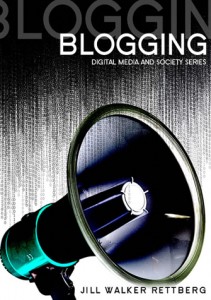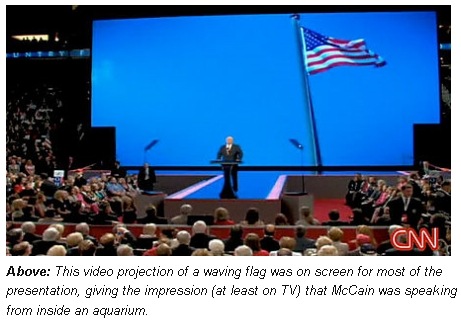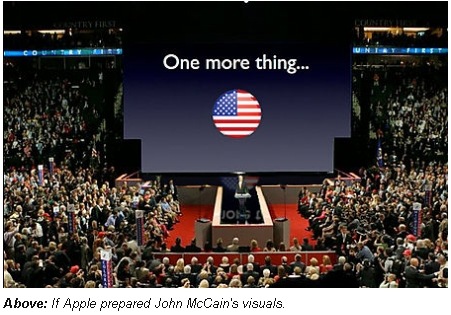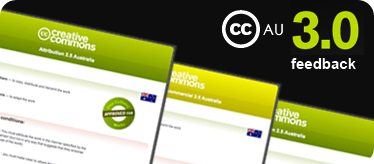Home » teaching and learning (Page 3)
Category Archives: teaching and learning
Presidential Presentation Zen
Those who’ve heard my thoughts on presentations in general (most are bad … including most of mine), you’ll also know I think Garr Reynolds’ Presentation Zen (the blog and the book) is the most insightful guide to contemporary presentation design currently available. Thus, I was fascinated by Garr’s take on the differences between Barack Obama and John McCain’s national convention speeches and the graphic elements which accompanied them. The short version: Obama presents like a deity, while McCain bombed in visual terms. In terms of teaching presentation, though, Garr did mock-ups of how McCain’s talk would have looked in different styles which really get you thinking. Here’s the difference between an MBA and Steve Jobs presenting so you can see what I mean (and why this would be useful when trying to get others to think through presentation in visual terms):
Student Digital Media Project Showcase
After getting off to a decent start with my blogging about student creativity this year, I seem to have fallen a little behind. I’ve had this post in draft form for ages, waiting for some insightful commentary to spring forth from my uncooperative brain, but alas, none has emerged so I thought I’d just showcase a few outstanding examples from my Digital Media (Comm2203) unit last semester and let them speak for themselves! While the first Student News assignment in this unit asked students to make a relatively traditional television news-style story (the best of which were screened on local tv), the final project was rather different as it was designed to provoke some hard thinking about digital media more broadly both in form and content. The outline for the final projects stated:
The Digital Media Project is designed to explore the affordances of digital video and media in an online context. Working in teams (the same as your Student News Project team), students will produce a 3-minute short digital video piece which critically explores an idea, concept or area which was discussed in or, or directly provoked by, the ‘Convergence & Transmedia Storytelling’ or ‘Citizen Journalism and Participatory Culture’ lectures, readings and seminars.
This project emphasizes (a) research in the area of digital media, (b) clarity in communicating and sharing a research-informed perspective or argument about part of the digital media landscape; (c) taking an innovative approach to creating digital media; and (d) technical proficiency in creating digital media.
Given that the first half of the unit was largely practical – many were first-time users of digital video cameras, sound equipment and non-linear editing software – I wondered if introducing conceptual material from the likes of Henry Jenkins and Axel Bruns might overwhelm students; on the contrary, I found almost everyone excelled at combining their newfound practical skills with wider issues and concepts. All 28 projects submitted were of a high quality, and everyone who took this unit should be proud of their work, but a few really did stand out amongst the rest and are well worth highlighting here.
The first project I want to mention is ‘Citizen Journ vs Traditional Journ‘ which mimics the style of the Mac Vs PC advertisements, with a stop-motion twist, to explore the changing relationship between traditional journalists and citizen journalists:
In a similar vein but using a really different technique, ‘Something Old, Something New‘ mixes excerpts from a 1940s documentary on being a journalist with contemporary footage to examine exactly how far journalism has changed in the face of participatory culture:
Looking at web 2.0 culture more broadly, ‘A Blog’s Life’ is a comical look at the evolution of blogging, in the style of a nature documentary:
And in a slightly more academic tone, ‘Transmedia Storytelling and Convergence’ gives a pretty good rundown of some core features of Henry Jenkins’ arguments about transmedia in the digital media landscape:
Finally, ‘Joe Bloggs Presents Web 2.0’ is a laugh out loud satire looking at the average blogger (A LANGUAGE WARNING, though: Joe Bloggs swears like an angry trooper!):
And, yes, I did have what can best be described as an awkward cameo appearance in that the adventures of Web 2.0 there – but it was worth if, if nothing else, for that outstanding end credits song! If you’re inspired to see more, 27 of the digital media projects can be found here. Also, it’s worth mentioning that the majority of students chose to post their work under a Creative Commons license (not all, I should add, but I’m pleased enough that by the end of the course everyone knew enough to make an informed choice one way or another).
Oh and quick shout out: my partner in crime in teaching Digital Media was Christina Chau who was an excellent tutor and whose own thoughts on the unit can be read here!
The Wired Everyday: Blogging (Lecture Slides and Notes)
Hello to anyone visiting from the Self.Net: Identity in the Digital Age course. The slides from my guest lecture are embedded here:
If you click the link and follow back to Slideshare, you’re welcome to download the slides for your own uses if that would be helpful.
Some of the links discussed today that you might want to explore:
* Rebecca’s Pocket (Rebecca Blood)
* Dear Raed (Salam Pax)
* http://jilltxt.net/ (Jill Walker Rettberg)
* Larvartus Prodeo (Mark Bahnisch et al)
* The Daily Kos
Comments or questions are welcome!
Links for August 4th 2008
Interesting links for August 3rd through August 4th 2008:
- Chinese netizens rail against Great Firewall [watoday.com.au] – A look at the heavy hand of internet censorship in China and the lengths China’s netizens have to go to to avoid being blocked. A recent example shows a meme that the phrase “I’m just doing push-ups” after the line was used by allegedly corrupt communist officials. The meme is going strong, one example being these photoshopped images of a popular Chinese TV host doing push-ups in various locations across China.
- Kind Strangers, Comicons, and the People that Need a Hug. [Nathan Fillion MySpace Blog] – Nathan Fillion, sees the future in Dr Horrible (despite being Capt Hammer!): “I think it can be said that Dr Horrible was a tremendous success. More than just an incredible project to enjoy, but a more than important view of entertainment to come. This is the future, everybody. This is a window into how things will be when the control is finally wrested from the moneyed claws of big business and placed, nay, returned to the caring hands of the creators.”
- Postmodern path to student failure By Justine Ferrari [The Australian] – In a new anti-postmodernism book, The Trouble With Theory, by Gavin Kitching, “insight” such as this appears: ‘Students equate the way language is used with the meaning of words, so that the word “terrorist” always means a person using extreme violence for political ends, and anyone called a terrorist is actually a terrorist. But he said such thinking excluded sentences such as: “Calling these people terrorists distracts attention from the justice of their cause. “They have a very narrow idea of how we use words. (They believe) words have given meanings, and these meanings have certain biases or prejudices. If you use words, you have to accept the biases or prejudices – you’re stuck with them. That you can use words ironically is not something they can take seriously. Clearly that’s not true. We use words to refer to things, but we can refer to them ironically, we can refer to them sarcastically, doubtingly, aggressively.”
- Britney and McCain in 2008 – Barely Political [YouTube] – New running mates: John McCain and Britney Spears. Not the most technically exciting YouTube political mashup, but the rhetoric matches perfectly!
- Notes on Cult Films and New Media Technology [zigzigger] – Interesting thoughts: “My basic point is that the availability of films to own on videotape, disc, or computer file marks a transformation in the way audiences engage with the film text, and that this transformation makes the cult mode of film experience much more typical, more available to more viewers and to more movies.”
An Anthropological Introduction to YouTube
Michael Wesch, an anthropologist focused on digital culture and YouTube (famous for the the videos The Machine is Us/Ing Us and A Vision of Students Today) has released (on YouTube) an excellent presentation he gave about YouTube’s history and cultural impact called An Anthropological Introduction to YouTube:
While much of the story Wesch presents will be familiar, this 55 minute package is an excellent overview and will no doubt prove an excellent resource for getting students thinking about the place of YouTube in digital culture. Beside which, it features a whole bunch of old favourites which should make it enjoyable viewing for almost everyone. (If a 55 minute YouTube clip is a bit much, Wesch has posted a timeline for the video in his blog, so pick up the story wherever you’re most interested.)
Creative Commons Australia – 3.0 License Drafts and more…
I’ve been meaning to post about all the exciting things Creative Commons Australia have been up to since I returned from the fabulous Building an Australasian Commons national conference (and the linked Creating Value: Between Commerce and Commons international conference), but it’s taken a few weeks so first off I want to draw your attention to the Creative Commons Australia 3.0 draft licenses which have been ported to Australia, bringing CCau up to date with the global 3.0 releases. The licenses are in draft form and open for comment now, so I’d encourage you to take a look and leave comments if any come to mind. This version is more directly based on the CCNZ 3.0 licenses which are considerably more understandable for the layperson (ie non-lawyer, like me). The public comment phase has been going for a while, and for comments to be addressed before the official release they need to be made by 1 August 2008 (yes, I should have mentioned this earlier, but go look now, you’ve still got a couple of weeks).
Equally exciting, a global project spearheaded by Creative Commons Australia has been released: the Creative Commons Case Studies project. One of the biggest challenges when explaining Creative Commons licenses to other people was the lack of examples. Sure, we can all talk about Cory Doctorow’s exemplary book licensing, but there are so many other projects out there using CC licenses to share, publicise and allow others to build upon and remix their work. Well, the Case Studies project makes life a whole lot easier, collating a wealth of examples from across the globe when groups, bands, corporations, universities and more have used CC licenses. Each case study features an overview, how the CC license is used, and the motivations for choosing a CC license; this structure ensures that we understand what CC licenses can achieve and the various philosophies behind their use (from philanthropic to purely promotional). The best part, though, is that the Case Studies project is wiki-based, meaning anyone who wants to can add an example either of their own use, or of someone else’s exemplary work under CC. I’ve got a couple of examples of past work with my students I’ll by adding soon, and I hope if you’ve been using CC licenses either in education or anywhere else, you might want to consider documenting your best examples to share with the world, too.
UWA Student News on Channel 31 THIS FRIDAY

With Perth’s community broadcaster, Access 31, alive for a while longer, it’s my great pleasure to announce that the eight best news projects from students in my Digital Media (Comm2203) unit this semester will be screening as a half an hour programme this Friday night (11 July, 2008) on channel 31 at 8pm. There are some very impressive segments in here, including several news stories which engage with critical issues for Perth right now, and about larger issues such as media and the upcoming Olympics. If you’re near a TV (and in Perth) this Friday at 8pm, please tune in and take a look!
For a sample of what’s going to be screened take a peak at this post.
Links for July 3rd 2008
Interesting links for July 3rd 2008:
- Virtual Worlds Research: Past, Present and Future (Vol 1, No 1) [Journal of Virtual Worlds Research] – The inaugural issue of the Journal of Virtual Worlds Research is out, showcasing some excellent research and situating virtual worlds in an ongoing and dynamic research context. It’s also an exemplar of open publishing: all content is online and under Creative Commons licenses.
- Uni cheats outsource to India [The Age] – “Computer Science students are farming out their coursework to cheap programmers in countries like India and university staff admit they are powerless to detect and prevent it….Various well-established sites already sell students essays and other written work.”
- Is YouTube Killing Video Originality? [NewTeeVee] – “…more people are creating …video than ever before… The issue becomes when people start creating for the playcounts. What?s the fastest way to rack up a million plays on YouTube, land an agent and get on Oprah? It?s not by making something new!”
- VioletBlue VioletBlue – An archive of all of the posts that Boing Boing deleted in relation to sex blogger Violet Blue. Looking through this archive, it’s hard to see how these deletions haven’t damaged Boing Boing’s historical presence.
- Firefox download record official [BBC NEWS | Technology] – Mozilla has officially made history with a new Guinness world record for the largest number of software downloads in a 24-hour period. The final record breaking 8,002,530 downloads for Firefox 3.0 took place in June with parties in over 25 countries.
Blogging (the book) by Jill Walker Rettberg

I’m delighted to see that Jill Walker Rettberg’s book Blogging has just been released. I had the pleasure of reading much of this book in draft form last year while Jill was a guest researcher here in Communication Studies here at UWA, and on the basis of what I read I’m confident this book will be extremely well received. Jill’s work is neither a simple how-to guide (of which there are many), nor is it a book on blogging which presumes readers are already blogosphere aficionados. Rather, Jill has managed to write an engaging and critical book which situates blogging within broader histories – such as the role of blogging in terms of literacy, the evolution of citizen journalism, blogs and/as social networks, and even ethical frameworks which examine advertising and authenticity in blogs. More to the point, for someone new to blogs as an idea, or in practice, Blogging offers a world of insight and experience distilled into a readable and engaging form.
The table of contents and the (extremely positive) early reviews of Blogging are available on Polity’s website, and it can be ordered now from Amazon UK or will be available from Amazon US in about two months.
I strongly recommend you read Blogging for yourself!





